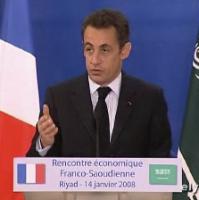PARIS -- When Nicolas Sarkozy took office last May, everyone expected him to be an active president. Known for his relentless pace and tireless work ethic, Sarkozy had promised to reinvigorate France's foreign policy, which had suffered from an accumulation of failure and fatigue under his predecessor, Jacques Chirac. To that end, Sarkozy has not disappointed. In a little over eight months as president, he has visited 25 countries on four continents, strengthening historic bonds (America), nurturing new ones (China, India), and above all raising France's profile around the world. Indeed, if there's been a surprise in Sarkozy's foreign policy, it has to do not with how active, but with how radioactive it has been. Everywhere he has gone, it seems, Sarkozy has been peddling nuclear energy. And while his aggressive advocacy for Areva, the French nuclear energy giant, in both China and India did not go unnoticed, it's his vigorous promotion of nuclear energy in the Arab world that has really attracted attention. Since last summer, Sarkozy has signed nuclear cooperation agreements with Libya, Algeria and most recently the United Arab Emirates; has signed a Memorandum of Understanding for such an accord with Qatar; has laid the groundwork for the same kind of deal with Morocco and Jordan; and has offered the arrangement to Egypt and Saudi Arabia. "What we're seeing," explained Bruno Tertrais, a research fellow at the Fondation de Recherche Statégique, "is a deliberate strategy of proposing nuclear partnerships that correspond to the regional demand."
France and the Middle East: Nicolas Sarkozy’s Nuclear Option

